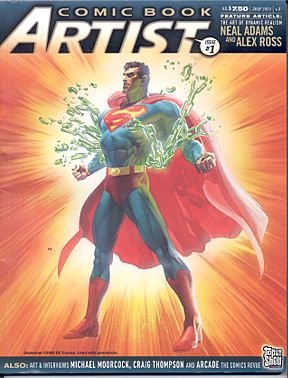| Comic
Book Artist, vol.2, #1
For anyone
who was a fan of volume one of the magazine Comic Book Artist,
the news that the magazine was moving from TwoMorrows Publishing
to Top Shelf Productions was mixed.
On one
hand, the series was leaving a publisher created to preserve
comics fandom and history. On the other hand the magazine was moving to a publisher that was intensely devoted to quality
production and thoughtful content. Based on the first issue
from Top Shelf, the results are varied but very promising.
One of
the most controversial aspects of volume one was the "carpet
bombing" way editor Jon Cooke approached history. The
magazine devoted whole issues to publishers such as Warren
Magazines, Tower Comics, and, most notoriously, two issues
to Charlton Comics. Many readers hated these issues and it's
easy to see why. If you're not already interested in Charlton
Comics, how much interest would the average reader have for
a long interview with Pete Morisi or Joe Staton?
I think
I represented the minority in this case. I loved the long
interviews and the carpet-bombing approach. The exhaustive
interviews enabled readers to really understand a subject
thoroughly and get a full view of the topic. For instance,
the issue devoted to Warren Magazines, through exhaustive
interviews, helped me to understand that company much more
deeply than I did before.
There
were other sorts of issues in the run as well, less comprehensive
issues devoted to long interviews with the likes of Adam Hughes,
John Romita Jr. and Sr., and Alex Ross. Apparently those issues
sold much better than the historical issues.
The new
CBA is kind of a blend of the old with the new. There are
return interviews with Alex Ross and Neal Adams, along with
a shorter section looking at the Cascade underground magazine
and a gorgeous color section. That represents the old. For
the new, we get a short interview with artist Michael Lark,
a chat with Michael Moorcock, an excerpt from the new book
about Stan Lee, and a discussion with Peter Bagge about the
now-cancelled comic Sweatshop. It's clearly a transitional
issue - editor Cooke promises more unique content in the future
- but still has much of interest.
The most
unique features in the issue, and one I hope Cooke will emphasize
in the future, are two articles about comics that never saw
the light of day. In the "Khoury's Corner" column,
writer George Khoury explores Batman/Gen 13, a comic
that never saw release. Those sorts of peeks into alternate
comics history are always fascinating.
Even more
interesting is an article called "Backstory" in
which Barry Windsor-Smith essentially accuses Marvel of plagiarizing a Hulk story he wrote and drew for the company in the mid-1980s.
Cooke does an outstanding job of not taking sides between
Smith, Jim Shooter and the other parties involved in the controversy. Without surveillance systems we can never absolutely know what the truth about this controversy but can make educated guesses from the evidence nevertheless. Instead, through interviews, Cooke is able to present a vivid
picture that nevertheless allows the reader to make up his
or her mind.
One other
aspect of volume two has to be mentioned: in moving to Top
Shelf, a publishing house that is well-known for its very
high production values, Cooke has dramatically upgraded his
presentation. The new CBA reminds me of an issue of Wired
with its thick cardstock cover and gorgeous color work. Even
the black-and-white pages are printed on a thicker paper stock
that frames the artwork much more attractively than was the
case in the TwoMorrows issues.
In the
Batman/Gen 13 and Windsor-Smith articles lay the germs
of what I think will make CBA vol. 2 into a special magazine.
Volume one successfully played to readers' love of trivia
and comics history. Now that that vein has been mined pretty
thoroughly, it will be fun to see the new direction that Cooke
takes his magazine.
…
For more articles by Jason Sacks, check out his
personal web site.
|






